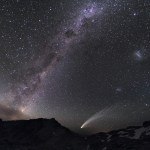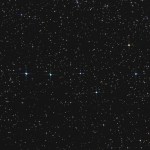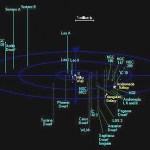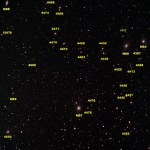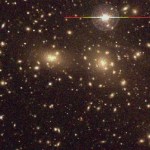cluster
"Who are we? We find that we live on an insignificant planet of a humdrum star lost in a galaxy tucked away in some forgotten corner of a universe in which there are far more galaxies than people." -Carl Sagan
Our night sky, quite literally, is our window to the Universe.
Image credit: Miloslav Druckmuller, Brno University of Technology.
Well, it's kind of a window to the Universe. I say only "kind of" because, with the exception of those two faint, fuzzy clouds in the lower right, everything else visible in the image above is part of our own Milky Way galaxy. In fact, practically…
This is an enhanced version (with some upgraded images and text) of an article I first wrote over two years ago. It is just as valid today as it was back then, only today, I have a special offer to go with it. Next week, a bunch of cosmologists and myself are getting together and all writing about dark energy. And I want you to have your say.
So at the end of this post, ask your dark energy questions. Ask anything and everything you ever wanted to know about dark energy. I'll choose the best one (or, space & time permitting, more than one) and write a special post on it for you then.…
"I would rather be adorned by beauty of character than jewels. Jewels are the gift of fortune, while character comes from within." -Plautus
When it comes to astronomy, there's no doubt that I've got a northern hemisphere bias. It's no surprise, of course; I live here. And while I often write about the skies that we all share, astronomy has a historical bias in favor of the northern hemisphere. You know this, too. Ask most people to name one single thing in the night sky, and you're most likely going to end up with this.
Image credit: Rich Richins of http://www.enchantedskies.net/.
The Big…
Some of you who've been following astronomy for awhile might remember this report, where a group of astronomers reported finding a giant "void" in the Universe.
What is a void? Well, galaxies are distributed pretty randomly, but because of gravity, they cluster together. A small example is our local group which looks like this,
and a larger example is the Virgo cluster, which is about 1,000 times as massive as our local group, and looks like this:
Well, a void is the opposite of a cluster, where you have a large volume of space that's simply empty of galaxies and matter. This press release…
Cameras, CCDs, prisms, grisms, etc., are all some of the instruments that can go on top of telescopes to help us see things better. We haven't really increased the size of telescopes so much as we have the quality and ability of the apparatus that go atop them. Take a look at various pictures I've stolen off the web, all taken by (avid) amateur astronomers in different years. The pictures are of M81 and M82, two galaxies in a group that make up possibly the nearest cluster of galaxies outside of the local group. (The closest is either the M81 group, the Centaurus group, or the IC 342 group.)…
Aaah, the Virgo cluster. A huge cluster of hundreds of galaxies, and our closest large neighbor in the Universe. People have known for a long time that although Virgo is still redshifting away from us, it isn't quite as fast as we would expect from the Hubble expansion rate of the Universe. Does this mean that we're gravitationally bound to it, and some day, we'll move into this dee-luxe apartment in the sky?
Nope. Dark energy is here to push it away from us, and we'll unfortunately see this bright neighbor recede farther and farther from us, until it disappears from our sight. So say your…
Last week, Pamela Gay over at Star Stryder pointed me to a press release which claimed that, among other things, perhaps dark matter wasn't necessary. So I wrote a guest post on her blog explaining why it was. Apparently, some people still aren't convinced. So I will lay out for you all the reasons I can think of why we need it, and explain what happens if you try to do without it.
1. Cluster Velocity Dispersions. When we take a look at galaxies, we often find hundreds or even thousands of them clustered together, like in the Coma Cluster. We can measure how quickly those galaxies are moving…
